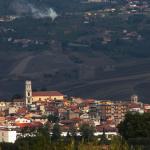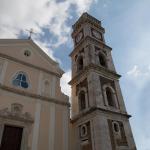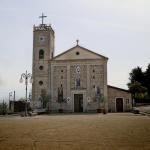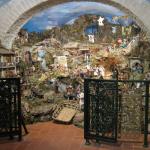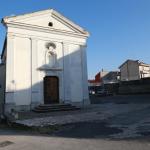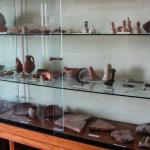The Municipality of Grottaminarda is located within the area of the Ufita Valley. It's a town with 7,897 inhabitants, located 405 metres above sea level, at 44 km from Avellino. The territory extends for 29.12 sq km and the adjoining municipalities are: Ariano Irpino, Bonito, Flumeri, Fontanarosa, Frigento, Gesualdo, Melito Irpino and Mirabella Eclano.
The etymology of the name is a compound of "cave" and a medieval name of person, Maynardus, of Germanic origin. The inhabitants are called Grottesi and Saint Thomas Aquinas is their patron saint.
PLACES OF INTEREST
- D’Aquino Castle - Medieval fortress that belonged for centuries to the various feudal families and became a municipal property in 1988, still dominates the old village of the “Fratta”
- Antiquarium Museum - Antiquarium of considerable interest, with its finds it testifies to the presence of man in the Ufita Valley since the Early-Middle Neolithic, that is, from the 5th millennium BC until the Roman era
- Church of Santa Maria Maggiore (Saint Mary Major) - Erected for the first time in 1478, but completely rebuilt in the second half of the 18th century, it preserves important works and is located a few metres from the D’Aquino Castle
- Sanctuary of Santa Maria di Carpignano - Inside, with a single nave, there is the precious panel painting depicting the Virgin and Child, one of the few representations of “Black Madonnas” in the province, dated by some scholars to the mid-12th century
- Dogana Aragonese (Aragonese Toll House) - Point of collection of feudal rights of transhumance in 1467, it was declared a national monument in 1930
- Church of San Michele (Saint Michael) - Among the oldest in the district, it is already mentioned in a document of the year 1178 preserved in the Archive of the Abbey of Montevergine
- King's Fountain - Splendid fountain at the entrance of the town, along the Via Nazionale delle Puglie, built in 1606 on a project by Scipione Galluccio and Andrea Insano, artisans of Cava de’ Tirreni
EVENTS
- Fiera dell’Immacolata - Important fair held on 8 December, interregional, with over 400 stalls with the most varied types of products and almost all the streets of the centre involved for an extension of about 40 thousand square metres
- Festone - It takes place in August since 1889 in honour of Saint Thomas, Saint Anthony and Saint Roch, whose statues are carried in procession through the town with robes richly adorned with gold jewellery
- Feast of Saint Anthony Piccirillo - Religious festival held on the first Saturday of August
- Feast of Saint Michael the Archangel - Festivities that take place on 29 September
- Feast of Saint Lucy - Celebrations that take place on 13 December
- Feast of the Madonna di Carpignano - Dedicated to the veneration of the Madonna, it takes place in the hamlet of the same name on the first Sunday of September
TYPICAL FOOD AND PRODUCTS
- Ciambottella PAT - A specialty of Grottaminarda with vegetables and a sauce made with hot chili pepper, tomatoes, green and red peppers, garlic and basil
- Irpinia Colline dell’Ufita PDO - Extra virgin olive oil deriving largely from the Ravece variety, characterised by a pleasant bitter and spicy taste
- Spantorrone di Grotta PAT - Traditional dessert whose recipe is handed down in the producing families of the Municipality of Grottaminarda: it is a particular type of pantorrone nougat, characterised by a particular friability (PAT)
- San Giovanni Apple PAT - Apple with a greenish-yellow skin, characterised by a very fragrant, crunchy and juicy pulp
- Ufita garlic PAT - Product with an aromatic flavour and characterised by a high amount of essential oils and active agents
- Ufita cherry tomato PAT - Of medium-small size, it has a bright red colour and numerous seeds inside
- Sant’Anna Pear PAT - Fruit with a delicious sugary taste, yellow in colour, has small red spots in the parts most exposed to the sun
- Caciocavallo irpino di grotta PAT - Spun curd cheese, produced with milk from small and medium-sized farms, from mainly Bruna cattle, traditionally aged in caves
FUN FACTS
Some believe that the name of Grottaminarda derives from a cave dedicated to the goddess Minerva (Cripta Minervae).
HISTORICAL NOTES
Inhabited since the Neolithic (5th-4th millennium BC), Grottaminarda is located in a strategic area and has been a land of passage on the Tyrrhenian-Adriatic route since ancient times, representing a fundamental commercial hub.
The origins of the village of Grottaminarda date back to around the 12th century, with the Norman Trogisio de Grutta, and it is known that in 1142 it became the property of the d’Aquino family. It was in fact with the d’Aquino family that Grottaminarda was fortified with walls, the Castle and several churches, extending to Portaurea, also called Porta Grande (Great Gate). Under the Aragonese, in 1443, it became a toll house, then transformed into a post station.
The municipality was heavily damaged by the earthquake of 1732, due to the proximity of the epicentre.
So that a holiday generates a useful impact to expand your vision of the world, it is advisable to go beyond the limits of your comfort zone. Grottaminarda with its old and new spirits lend itself to this thanks to its unique experiences
Grottaminarda
Via Alcide de Gasperi, 83035 Grottaminarda AV, Italia
Did you like it? Leave a review
Your opinion is important! It will be visible after approval by the editorial staff.
To post a comment you must be an authenticated user. Log in with Social Login
